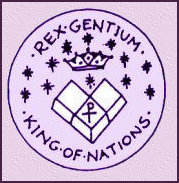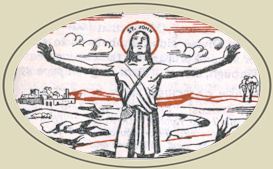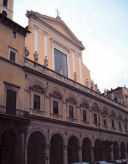Make your gift today!
Help keep Catholics around the world educated and informed.
Already donated? Log in to stop seeing these donation pop-ups.
» Enjoy our Liturgical Seasons series of e-books!
"Hail, full of grace! The Lord is with you." But she was greatly troubled at what was said and pondered what sort of greeting this might be. Then the angel said to her, "Do not be afraid, Mary, for you have found favor with God. "Behold, you will conceive in your womb and bear a son, and you shall name him Jesus. He will be great and will be called Son of the Most High, and the Lord God will give him the throne of David his father, and he will rule over the house of Jacob forever, and of his kingdom there will be no end."
Click here for commentary on the readings in the 1962 Missal of the Roman Rite.
The Fourth Sunday of Advent
The first reading is taken from 2 Samuel 7:1-5; 8-11;16 and refers to when David was anointed king in Hebron by all the tribes of Israel and Judah and his first step was to capture Jerusalem from the Jebusites and make it the political capital of his kingdom.
The second reading is from the Letter of St. Paul to the Romans 26:25-27 where he introduces himself to the Christians in Rome and he gives an incomplete synthesis of his theology. His words remind us to give glory to God this Christmas and always, for the marvelous things he has done for us.
The Gospel is from Luke 1:26-38. At the moment our Lady said: "be it done to me according to thy word" the most stupendous event that ever happened, or ever could happen on earth, took place on this planet of ours. The Son of God took on human nature in the womb of the Blessed Virgin. We are familiar with this story from childhood. We often say the Angelus in which this tremendous act of God's love is described. Although familiarity, in this case, does not breed contempt, it does help to blunt the real impact on our minds of such an extraordinary occurrence. If God had created a very special child, and made him into an outstanding saint, so that he could intercede with God for us, this would be a great act of love for us on God's part. Or, if he had sent an angel from heaven in human form, to teach us all about God and to help us to lead holy lives, this would deserve our deepest gratitude. But neither a saintly man nor a holy angel could do for us all that God wanted. No man or angel could make us adopted sons of God and heirs of heaven. It was necessary, in God's plan for us, that his divine Son should become man, should share our humanity so that we could share his divinity.
Could infinite love have gone any further? Our creation, the fact that we exist as human beings on earth, is a great gift to us on the part of God. Of what value could eighty, a hundred, even seven hundred years of a continuously happy life on this earth be for us if we learned that we had to depart life forever one day? In a world tormented by sin and its evil effects our normal span of life would be less satisfying. However, when God created us, he so planned that our stay here would be but a stage, a stepping stone in fact, toward our everlasting home. We are well aware indeed of the lengths to which God's love has gone in order to make us his children and heirs to his kingdom. Are we, however, grateful to him for the love he has shown us? Are we honestly and sincerely trying to make ourselves worthy of the great future he has in store for us?
Today is a suitable occasion to look right into our hearts, to see how we stand with God. During the week we shall be keeping the feast of Christmas. The Baby in the manger will remind us of what God has done and is still doing for us. What are we doing in return? Have we shown our gratitude by living as true followers of Christ? If most of us must answer: "no," this is the time to change our course and return to the right road once more. God is asking this of us today. Shall our answer be: "behold here I am Lord, your humble and grateful servant, let it be done to me according to your word"?
—Excerpted from The Sunday Readings by Fr. Kevin O'Sullivan, O.F.M.
![]()
O King of the Gentiles
"Come and save man, whom Thou hast made out of dust." What is man? He is but a particle of dust, an insignificant creature who has further separated himself from God through sin. He has been cut off from the fountain of truth and banished from God to darkness and misery. Still in the ruins there dwells a spirit that possesses a capacity for truth. In these ashes there is yet a spark that may be fanned to life to burn with the brilliance of divine life. But only God can revive this flame. For this reason the Church cries out, "Come and save man, whom Thou hast made out of dust." Save him who is so weak, so miserable and helpless. Remember his nothingness. Consider the many enemies who lay snares to rob him of divine life and to entice him into sin. Think of his obscured knowledge and his proneness to evil, of his tendency to error, and his weakness in the face of temptation. Guard him from the enticements of the world; shelter him from the poison of erroneous teaching; deliver him from the devil and his angels.
During these days before Christmas, the Church contemplates the overwhelming misery of unregenerated mankind. She cries out, "Come and save man, whom Thou hast made out of dust."
Jesus is King of all nations. "The kings of the earth stood up and the princes met together against the Lord and against His Christ. Let us break their bonds asunder, and let us cast away their yoke from us. He that dwelleth in heaven shall laugh at them, and the Lord shall deride them. Then shall He speak to them in His anger and trouble them in His rage. But I am appointed king by Him over Sion, His holy mountain. ... The Lord hath said to Me; Thou art My Son; this day have I begotten Thee. Ask of Me and I will give Thee the Gentiles for Thy inheritance, and the utmost parts of the earth for Thy possession" (Ps. 2:2-8). Well may Herod seek the life of the newborn king. Indeed, many kings and tribes and nations in the course of time shall deprecate the divine King, Christ. But to Him has been given all power in heaven and on earth (Matt. 28: i8). Before Him every knee shall bend, and every tongue shall confess that He is the Lord (Phil. 2:10f.).
The more the mighty condemn the kingship of Christ, the more shall He be exalted by the Father.
Now He comes to us in the form of a lovely child. One day in the presence of the Roman governor He will assert His right to kingship. But after this one public confession of His royal origin He withdraws again into the obscurity which He had freely chosen. For the present He is satisfied with this manifestation of His royal dignity. The day will come, however, when He will manifest it with power and majesty as He comes again on the clouds of heaven. Before all nations God will declare: "I have anointed Him King of Sion. My holy mountain." All men shall pay Him homage as king; all nations shall acclaim Him the King of Glory.
—Excerpted from The Light of the World by Benedict Baur, O.S.B.![]()
 6th O Antiphon:
6th O Antiphon:
Symbols: Crown and Scepter
Come, and deliver man, whom You formed out of the dust of the earth.
O King of the Gentiles and their desired One, the Cornerstone that makes both one; Come, and deliver man, whom You formed out of the dust of the earth.
O Rex Gentium, et desideratus earum, lapisque angularis, qui facis utraque unum: veni, et salva hominem, quem de limo formasti.
The crown and scepter signify Christ's universal kingship. As we sing in the fifth O Antiphon, Christ is not only the King of the Jewish nation, but the "Desired One of all," the cornerstone which unites both Jew and Gentile.
Recommended Readings: Apocalypse 15:1-4
![]() Today is Day Five of the Christmas Novena.
Today is Day Five of the Christmas Novena.
 Commentary for the Readings in the 1962 Roman Missal:
Commentary for the Readings in the 1962 Roman Missal:
Fourth Sunday of Advent
"John, the son of Zachary," to a world now awaiting its God, pleads for our final pre-Christmas "make ready." "Make ready the way of the Lord, make straight His paths" (Gospel).
Heroically, in the desert, he warns against the softness of life in the city, pictured in the background. Alive to the danger of a "soft garments" life, he is seen in a rough "garment of camel hair," carrying a baptismal shell, "preaching a baptism of repentance."
—Excerpted from My Sunday Missal, Confraternity of the Precious Blood
Advent Reflection: The Light of a New Humanity
Anyone who goes through our streets in the early days of December will often meet him, Santa Claus, dressed more or less as a bishop and never without his long white beard (which has been attributed to him since at least the eighth century). What these Santa Claus figures say and do is also more or less episcopal in nature; often they are more in the role of the bogeyman than of one who makes present the love of the Holy One, that love of which the legend speaks in many variations. It is almost impossible to tell with historical precision who this man was; and yet, by listening attentively to the oldest sources, through the mists of time, we can still discern the radiance of a figure who opens up a door to Advent, who can mediate, that is, an to of Jesus Christ.
In his portrayal of the life of St. Nicholas, his most ancient biographer, a certain Archimandrite Michael, says that Nicholas received is dignity from Christ's own sublime nature just as the morning star receives its brilliance from the rising sun. Nicholas was a living imitation of Christ: "In the radiance of his virtues", says the biographer, "the sun's righteousness has dawned." Tradition has always equated Santa Claus with the Bishop Nicholas who participated in the Council of Nicaea and, together with that first great assembly of bishops, helped to formulate the affirmation of the true divinity of Jesus Christ. What was at stake here was the core of Christianity, whether Christianity was to become just another sect or something really new, faith in the Incarnation of God himself. Was Jesus of Nazareth only a great religious man, or had God himself actually become, in him, one of us? So, ultimately, the question was this: Is God so mighty that he can make himself small; is he so mighty that he can love us and really enter our lives? For if God is too far away from us to love us effectively, then human love too is only an empty promise. If God cannot love, how can man be expected to do so? In professing faith in God's Incarnation, therefore, it was ultimately a case of affirming also man's capacity to live and die in a human manner. The figure of St. Nicholas, Santa Claus, illustrates and symbolizes this connection.
Theodor Schnitzler put this very well: "In putting his signature, in faith, to the mysterium of the incarnate Son of God, a person is enabled to be a helper of his fellow men, to bring happiness to children, families and the oppressed. Faith in the Incarnation promotes the salvation of mankind and the implementation of human rights."
The oldest sources concerning St. Nicholas also point in the same direction from a different angle: Nicholas is one of the first people of to be venerated as a saint without having been a martyr. During the persecution of Christians, those who opposed the pagan state power and gave their lives for their faith had quite automatically become great examples of faith. When peace was concluded between Church and state, people needed new models. Nicholas impressed them as one ready to help others. His miracle was not that of great heroism in the face of torture, imprisonment and death. It was the miracle of constant kindness in everyday life.
Another of the legends expresses it very beautifully in this way: Whereas all the other miracles could be performed by magicians and demons, and thus were ambivalent, one miracle was absolutely transparent and could not involve any deception, namely, that of living out the faith in everyday life for an entire lifetime and maintaining charity. People in the fourth century experienced this miracle in the life of Nicholas, and all the miracle stories which accrued subsequently to the legend are only variations on this one, fundamental miracle, which Nicholas' contemporaries compared, with wonder and gratitude, to the morning star reflecting the radiance of the light of Christ. In this man they understood what faith in God's Incarnation means; in him the dogma of Nicaea had been translated into tangible terms.
The morning star which receives its light from the rising sun—this ancient description of St. Nicholas is also one of the oldest images of the meaning of Advent. If we are to be continually lighting candles of humanity, giving hope and joy to a dark world, we can only do so by lighting them from the light of God incarnate. This, at the deepest level, is the message of all Santa Claus figures: from the light of Christ we are to light the flame of a new humanity, caring for the persecuted, the poor, the little ones—this is the core of the legend of St. Nicholas.
—Joseph Cardinal Ratzinger, Seek That Which is Above

Fourth Sunday of Advent
Station with Ss. XII Apostoli or Santi Dodici Apostoli (Church of the Twelve Holy Apostles):
At Rome, the Station is in the Basilica of the Twelve Apostles, better known in Rome as better known as Santi Apostoli. We receive today a twelve-fold blessing from the apostles with whom we celebrate this last Sunday of Advent. As living stones we are built on these twelve solid and sacred foundation stones who themselves rest on the divine cornerstone, Christ. Ye holy apostles of Christ, be with us and pray for us, that with well-prepared hearts we may "go forth to meet Him, and say: Great is His dominion, and His kingdom will have no end; He is God, the Mighty, the Ruler, the Prince of Peace."
For more on Santi Dodici Apostoli, see:
For further information on the Station Churches, see The Stational Church.






